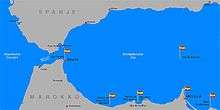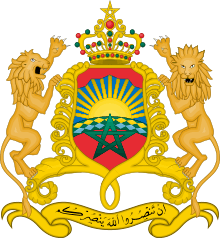Morocco–Spain relations
 | |
Morocco |
Spain |
|---|---|

In recent times, Morocco–Spain relations have been friendly though intermittently discordant.[1]
Spain occupied two territorial enclaves on Africa's Mediterranean coast (Ceuta and Melilla) that are also claimed by Morocco and sometimes cause bilateral tensions. Other territorial disputes and the Western Sahara issue also sometimes cause tension. In October 2001, Morocco recalled its ambassador from Madrid after pro-Saharan groups in Spain conducted a mock referendum on the fate of the region. In the July 2002 Perejil Island crisis, Spanish troops ejected Moroccan soldiers from the uninhabited Perejil Island off the Moroccan coast; Spain asserted that it had controlled the island for centuries. Diplomatic ties were not restored until January 2003. That July, Morocco complained that Spain lacked neutrality on the Sahara issue when it chaired the United Nations Security Council and, in October, Spain suspended arms sales to Morocco due to the Perejil crisis. Spanish Prime Minister Jose Luis Rodriguez Zapatero visited Morocco in April 2004, and King Juan Carlos I visited in January 2005; on both occasions, joint statements called for a negotiated settlement to the Sahara issue—the Moroccan position. However, visits to Ceuta and Melilla by the Spanish prime minister in January 2006 and monarchs in November 2007 again set back relations. The two neighbours also have an unresolved dispute concerning territorial waters between Morocco and the Spanish Canary Islands in the Atlantic Ocean. Morocco's "super port" at Tangier will pose competition that concerns Spanish ports. Financed by Arab states of the Persian Gulf, its construction began in June 2009. It is expected to achieve full capacity in 2014.[1]
Territorial disputes, despite their drama, are subordinate to the continuing and productive economic cooperation between both countries, there is also shared interests in counterterrorism, counternarcotics, and efforts to stem illegal immigration. Morocco notably assisted Spanish authorities in the investigation of the 2004 bombings in Madrid and this relationship continues. Moroccan soldiers have served under Spanish command in the United Nations Stabilization Mission in Haiti and Moroccan gendarmes have joined Spanish patrols to combat illegal immigration in the Strait of Gibraltar.[1]
On 31 July-1 August 2018 Morocco indefinitely closed the Beni Ansar Customs near Melilla.[2]
Country comparison
| Coat of Arms |  |
.svg.png) |
| Flag |  |
 |
| Population | 33,848,242 | 46,423,064 |
| Area | 446,550 km2 (172,410 sq mi) | 505,990 km2 (195,360 sq mi) |
| Population Density | 73/km2 (190/sq mi) | 92/km2 (240/sq mi) |
| Time zones | 1 | 2 |
| Capital | Rabat | Madrid |
| Largest City | Casablanca – 3,359,818 | Madrid – 3,141,991 |
| Religion | Islam (official) - 99% other religions - 1% |
Roman Catholicism - 68% Irreligious - 27% / other religions - 2% |
| Government | Unitary parliamentary constitutional monarchy | Unitary parliamentary constitutional monarchy |
| First Head of State | Idris I of Morocco (Idrisid dynasty) Al-Rashid of Morocco (Alaouite dynasty) |
Charles I of Spain (House of Habsburg) Philip V of Spain (House of Bourbon-Anjou) |
| First Head of Government | Mbarek Bekkay | Francisco Martínez de la Rosa |
| Head of State | Monarch: Mohammed VI of Morocco | Monarch: Philip VI of Spain |
| Head of Government | Prime Minister: Saadeddine Othmani | Prime Minister: Pedro Sánchez |
| Legislature | Parliament | General Courts |
| Upper house | House of Councillors President: Hakim Benchamach |
Senate President: Pío García-Escudero |
| Lower house | House of Representatives President: Habib El Malki |
Congress of Deputies President: Ana Pastor Julián |
| Official language(s) | Arabic, Berber | Spanish |
| GDP (nominal) | US$109.824 billion (3,151 per capita) | $1.313 trillion ($28,359 per capita) |
Demography
- Moroccans in Spain
- Islam in Spain
- Beth Yaacov Synagogue (Madrid, Spain)
- Arabic language in Spain
- Berber language in Spain
- Spaniards in Morocco
- Spanish language in Morocco
- Christianity in Morocco
Common history
- Hispania
- Byzantine Hispania
- Caliphate of Cordoba
- Taifa of Ceuta (in Ceuta and Tangier)
- Almoravid Empire
- Almohad Empire
- Benimerin Empire
See also
References
- 1 2 3 Alexis Arieff. "Morocco: Current Issues". Congressional Research Service (June 30, 2011).

- ↑ Cembrero, Ignacio. "Marruecos cierra unilateral y definitivamente la aduana de Melilla". El Confidencial.